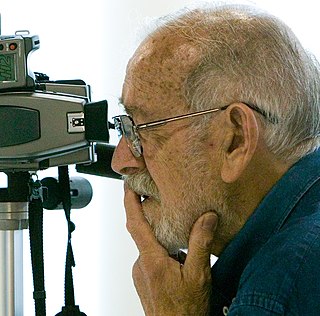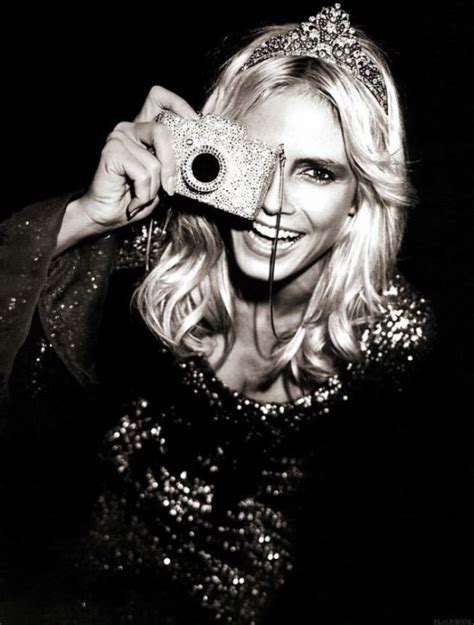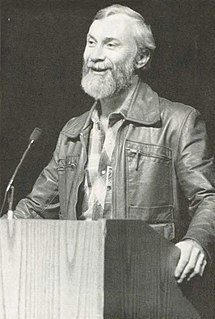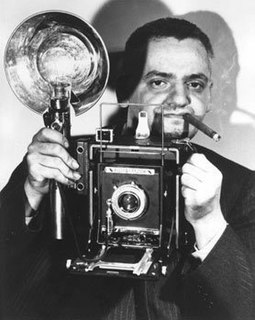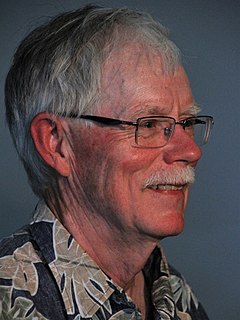A Quote by Olivia Arthur
When I first asked to take pictures of women at their homes, I was using my formal camera and I struggled to get the shots because I was still very much in the role of the photographer. Then the next time I had this little digital camera and their response to me would be completely different - I was a friend and I got new kinds of pictures. I was always treading a line between photographer and friend.
Related Quotes
Once a photographer is convinced that the camera can lie and that, strictly speaking, the vast majority of photographs are camera lies, inasmuch as they tell only part of a story or tell it in distorted form, half the battle is won. Once he has conceded that photography is not a naturalistic medium of rendition and that striving for naturalism in a photograph is futile, he can turn his attention to using a camera to make more effective pictures.
Somehow Annie Flanders from the SoHo News heard I was doing pictures and was headed to Paris. She saw my worked, liked it, and asked me to take pictures for her paper while I was there, but told me I would first have to buy a real camera - 35-millimeter. I got a little book that taught me how to load film. I read it on the flight to Paris. Hours later, I found myself at the top of the Eiffel Tower with Yves Saint Laurent and Andy Warhol. It's all been downhill since then.
I seem to walk in the world as two people. The normal everyday-me is as preoccupied, unobservant and oblivious to visual clues as I ever was. Then there is the photographer-me, the one who has a camera in hand and a specific project in mind, and then the world suddenly jumps to life with potential pictures, as if a switch had been thrown in my brain and a different person is looking out of the same eyes.
I’m no part time dilettante photographer, unlike the bartenders, shoe salesmen, floorwalkers plumbers, barbers, grocery clerks and chiropractors whose great hobby is their camera. All their friends rave about what wonderful pictures they take. If they’re so good, why don’t they take pictures full—time, for a living, and make floor walking, chiropractics, etc., their hobby? But everyone wants to play it safe. They’re afraid to give up their pay checks and their security they might miss a meal.
At the beginning, people laughed at me because I was using snappies. Sometimes, a celebrity would look at my camera and go, Oh, I've got one of those. I'd feel like handing it to them and saying, Well, you take the pictures then. But I like using snapshot cameras because they're idiot-proof. I have bad eyesight, and I'm no good at focusing big cameras.
I recommend for people, if this is the first time they're going to see an eclipse, don't get bogged down in trying to take pictures of it, because you'll spend much too much time fiddling around with cameras. Unless you've got the strength to just take a quick snapshot and let it go at that and not mess with the camera. Try to drink it in with your eyes and enjoy it.
I have received the digital camera as a blessing. It has really changed my life as a filmmaker, because I don't use my camera anymore as a camera. I don't feel it as a camera. I feel it as a friend, as something that doesn't make an impression on people, that doesn't make them feel uncomfortable, and that is completely forgotten in my way of approaching life and people and film.
At age 12 I had an obsession with Kubrick's A Clockwork Orange and then proceeded to watch all the other Kubrick films I could including a doc called Stanley Kubrick: A Life in Pictures in which it was revealed to me that he started as a photographer...I got a camera sometime shortly after, but spent many years just photographing flowers in my neighborhood.
If you need to strap a camera to you or get in a small space, then it makes sense to use digital.I do think it is possible to use a digital camera artistically, but it can only be good if you are using film technique. Film has grain, and digital has pixels, and there is not that much of a difference, but digital does not replace the need to create a scene and light it properly and spend time considering the shot.
Making photos is helpful of course to master the craft. To get comfortable with the camera. Learn what a camera can do and how to use the camera successfully. Doing exercises for example if you try to find out things that the camera can do that the eye cannot do. So that you have a tool that will do what you need to be done. But then once you have mastered the craft the most important thing is to determine why you want to shoot pictures and what you want to shoot pictures of. That's where the thematic issue comes to life.

